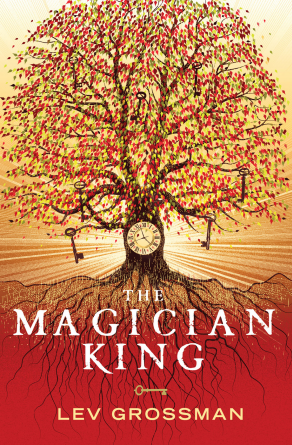By Dessa Bayrock (The Cascade) – Email
Print Edition: December 6, 2011
 The Magician King, by Lev Grossman, is the best-selling sequel to his 2009 novel The Magicians. Although this is only the third novel he’s written, The Magicians is one of my favourite books, and I held similar high hopes for The Magician King. The two books (dare I say series?) are set in a fairly straight-forward world similar to our own. The difference, as you may have guessed, is the existence of magic, which our intrepid, geeky hero Quentin Coldwater discovers when he passes a strange entrance exam at a college he didn’t apply to. Quentin, more intelligent than 99 per cent of his high school grad class and insufferably aware of it, has a massive Harry Potter moment where he realizes that he is intended for greater things.
The Magician King, by Lev Grossman, is the best-selling sequel to his 2009 novel The Magicians. Although this is only the third novel he’s written, The Magicians is one of my favourite books, and I held similar high hopes for The Magician King. The two books (dare I say series?) are set in a fairly straight-forward world similar to our own. The difference, as you may have guessed, is the existence of magic, which our intrepid, geeky hero Quentin Coldwater discovers when he passes a strange entrance exam at a college he didn’t apply to. Quentin, more intelligent than 99 per cent of his high school grad class and insufferably aware of it, has a massive Harry Potter moment where he realizes that he is intended for greater things.
His ego, however, is quickly drained. Magic isn’t easy, and requires intense practice of dead languages, precise hand movements, and constant awareness of “circumstances”: what time of year it is, where the sun and moon in are relation to each other, geographical location, temperature, and any number of other factors that change at a moment’s notice. On top of the workload, Quentin is, for the first time, surrounded by students who are just as insufferably intelligent as he is. It’s too much work for many students; Quentin, however, dives into it with the grim, unrelenting dedication of someone who must excel at everything. He makes new friends, undergoes some crazy magic trials, and has all the regular experiences a college student has.
The other theme that runs through the books is reference to an imaginary series of books the characters all read as children – strikingly similar to the Narnia series, it instead focuses on the magical land of Fillory, and the Chatwin children who explore and adventure there. The series is Quentin’s guilty pleasure – the Fillory books are classics, so everyone has read them, but Quentin can almost quote them from memory. This comes in handy when, after he graduates, he and his magician friends find out that Fillory is real, travel there, and save it from an impending threat.
This all sounds terribly cliché, I realize. But the time they spend is quite short in relation to the rest of the novel, and is nowhere near the ideal portrayed in the original Fillory books. There is a lot of nasty magic that they were never taught in school, and the Fillory they find is falling apart at the edges in a grim parody of their expectations. Grossman handles this part of the novel masterfully, skipping from description to description in a way that is almost absurd, and highlights how after losing something precious, everything—no matter how wondrous—loses its colour.
The book ends in the ideal way to end the story forever, which was why I was surprised when a sequel appeared on bestseller lists. The Magicians was the perfect mix of real-life work and magical theory to make it entertaining, but tipping the balance too much one way or the other would land Fillory squarely in cliché territory. I approached The Magician King both hesitantly and with trepidation, and rightfully so. The first 120 pages were everything I feared they would be – a sickeningly fantasy-sweet description of their lives as kings and queens. Quentin leads a lazy, boring life as a king, and the reader is similarly bored. There is no real-world grit, and the introduction of an arms master named Jollyby and a talking rabbit is enough to have anyone throwing the book across the room. I was ready to put it down and never touch it again.
However, 120 pages in, Grossman swaps the point of view suddenly, from Quentin to another character, Julia, who was a minor character in The Magicians. These chapters, which Grossman begins interjecting periodically, are a flashback to Julia’s own version of what happened in The Magicians. These events line up neatly with what’s happening in Fillory, as Quentin and Julia go on a quest for seven golden keys and are suddenly transported back to real-world earth. Grit and realism is back in place to season the pure fantasy nature of Fillory, and with this balance achieved, The Magician King can dive back into the postmodern twist on adventure that poses questions for every reader: what is important? What’s worth giving up for power, for a sense of home, or love? What does it mean to be a hero? How do we deal with the effect the past has on the future? What constitutes redemption?
This novel has the hallmarks of one written without a clear plan – the plot meanders, heads off in odd directions, and grows organically. This results in not everything necessarily adding up in the end, but not in a glaring way. In the end, the reader is satisfied with the way that turns out. Balance is restored, and the vague undertones of justice and heroism definitely leave something to chew over.


